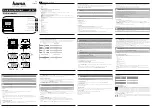
1
2
3
Freeko II PIR
Installation Instructions
REV 1
Introduction
The Freeko II PIR is an advanced, fully
supervised low-current wireless PIR that
includes a Freeko RF transmitter. Both
transmitter and detector circuits are powered by
long life Lithium battery.
Each Freeko II PIR has a unique ID code (this
code is impossible to reproduce). Compatible
Freeko RF receivers are designed to “learn”
specific IDs and respond only to them.
Following detection, Freeko II PIR triggers the
on-board transmitter that transmits its specific
Freeko II RF ID followed by an alarm signal and
status designators for battery condition. If
detector cover is removed Tamper Event
triggers the on-board transmitter.
Alarm and other data are forwarded to the
alarm control panel. A periodic test
transmission for supervision purpose takes
place automatically once in 12~14 min. The
receiver is informed that the particular
detector is taking an active part in the
wireless security system.
The FR II PIR has unique Alarm Power
Saver (APS) mechanism that enables
transmitter activation only 2 min after the last
movement has been detected.
Features
•
State-of-the-art wireless security system
•
Low current PIR Technology
•
Powered by a 3 Volt Lithium battery
•
Battery life: up to 4 years
•
Built in Automatic Power Saver (APS)
•
Frequency Band: 868 MHz, 433 MHz
•
Low Battery condition signal transmission
•
Test mode for PIR coverage and RF signal.
•
Range up to 1 km at free space.
•
Height installation calibration free (1.5m - 3.6m).
•
Unique ID number
4
5
6
Operation
The Wireless PIR transmits the following
events data:
Supervision
-
a periodical transmission.
Every 12~14 min indicates detector’s
presence.
Alarm
– alarm transmission triggered by PIR
intrusion detection.
Low Bat
– Whenever the battery reaches a
pre-set low level (2.4V) Battery Low signal
will be sent with the next message
(Supervision, Alarm, etc).
Tamper
– Whenever the FR II PIR cover is
removed or the unit’s cover is put back, a
message will be transmitted with “Tamper”
signal.
APS
The unique APS (Automatic Power Saver)
function built in the detector enables a battery
life span up to four years. The detector will
transmit only when the last event has occurred
more than 2 minutes prior to the current one.
Select Mounting Location
Select the mounting location so that an
intruder will cross the beams of the selected
pattern.
As the detector is a wireless transmitter, and
in order to take full advantage from PIR
sophisticated operation, do not install the
detector in areas where large metal objects
could interfere the transmission of signals. It
is also advisable to avoid following locations:
•
Facing direct sunlight.
•
Facing areas that may change
temperature rapidly.
•
Areas where there are air ducts or
substantial airflows.
•
Installation on metal wall.
The Freeko II PIR performs better when
provided with a constant and stable
environment.
FIG. 1 - Front Cover Removal
7
8
9
Mounting the Detector
1. To remove the front cover, unscrew the holding
screw and insert a flat screwdriver in the slot
between the front and the bottom above the
holding screw hole and push gently, until the
front cover is disengaged and the opening click is
heard.(Fig. 1)
2. To remove the PC board, carefully unscrew the
holding screw located on the PC board.
3. Break out the desired holes for proper installing.
4. Mount the detector base to the wall, corner or
ceiling.
5. Reinstall the PC board by fully tightening the
holding screw.
6. Before battery replacement capacitors discharge
must be done - use flat screwdriver to make
momentary short circuit for JP2 pins.(Fig. 3)
7. Install battery in the battery holder according
polarity.
8. Replace the cover by inserting it back in the
appropriate closing pin until the closing click is
heard.
FIG. 2 - Knockout Holes
A
B
B
B
B
C
C
C
C
D
FIG. 3 - PCB Layout
BATTERY
TEST PUSH
BUTTON
(OPTIONAL -
MAGNET
SWITCH)
PYROSENSOR
TAMPER
RESET
ANTENNA
10
11
12
Setting up the Detector (Fig. 3)
The sensitivity adjustment jumper sets up the
detector for normal or harsh environment
condition.
Setting the Sensitivity Adjustment (Pulse
Width) Jumper
•
Position 1= Normal
•
Position AUTO = Harsh
The “1” position setting is for normal operation.
The “AUTO” position setting is for harsh
environment locations with air drafts or small
animals.
RSSI – RF Signal Indication
The Freeko RF control panel has “RF Signal
quality Indication” for each transmitter in
order to help the installer to define best
location for the detector from RF point of
view.
The indication value is between 1 and 100,
where 100 is the best RF received signal. If
the RSSI indication is less then 30, it is a
sign for weak RF link, try to find a better
installation for the PIR.
NOTE:
See Freeko RF control panel installation
instruction.
WARNING: Test this product at least
once a week.
ID registration - “Learn” procedure
Refer to the system receiver’s installation
instructions and follow the procedure given there
for “learning” detector IDs.
Perform transmission by pressing and
releasing tamper switch for learning it by
FREEKO RF control panel receiver.
Make sure that the receiver is at learning
mode - according to control panel installation
instruction.
Note:
It is recommended to power up the detector
and let the system receiver “learn” the
detector’s ID before actual installation.
A. Not in use
B. Use for flat
wall mounting
C.
Corner
mounting -
use all 4
holes. Sharp
left or right
angle
mounting -
use 2 holes
(top and
bottom)
D. For bracket
mounting




















